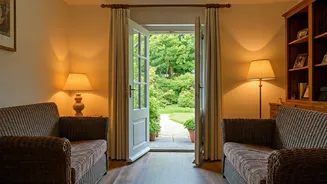Defining the Foundation
The idea of 'home' stretches far beyond bricks and mortar; it encompasses a blend of feelings, memories, and social interactions that build our identity.
It's where we discover who we are, creating our first experiences of the world. The comfort and security we find within a home become the bedrock of our lives, influencing our emotional state and providing us with a feeling of belonging. Home acts as a haven in a chaotic world, offering shelter from external difficulties and a safe space to be ourselves. This sense of safety permits us to be open, allowing us to build connections with people and form a sense of community. The significance of home also shifts according to our experiences and relationships, turning into a symbol of love, family, and shared history.
Emotional & Psychological Bonds
At the heart of 'home' lies a deeply personal emotional bond. Within the walls of our home, we establish emotional connections, experiences, and relationships. This includes our families, friends, and pets. The environment itself can affect our mood; for example, a comforting, welcoming space will provide a sense of tranquility, whereas a neglected space might add to feelings of instability. The memories built in our homes become intertwined with our identity. Think of holiday gatherings, the smells of cooking, or the rooms we grew up in. These create a feeling of nostalgia and make us want to hold on to the positive times from the past. Moreover, the psychological effect of home can affect our mental state. The idea of having a safe place, a private place where we can be open and at ease, is essential for our well-being, as it enables us to cope with the world and overcome challenges.
Social and Cultural Significance
Beyond individual emotions, 'home' carries important social and cultural meanings. In many cultures, the home is the center of family life, reflecting our family traditions, values, and way of life. It's a place where traditions are passed down through generations, preserving cultural heritage. The home also plays a role in community dynamics. Whether it is through local festivals, neighborhood associations, or sharing meals, we see how homes can become hubs for the building of social ties. Home often represents status and identity within society, reflecting our socioeconomic position, our personal taste, and our cultural background. In a way, the importance of home goes beyond its four walls, becoming a fundamental element of both individual and community identity.
Evolving Concept of Home
The idea of 'home' changes as people's lives evolve. People have their first homes when they are very young, then the meaning changes as they start to move out and live alone or build their families. Factors like culture, age, life stage, and personal growth greatly influence our views on 'home'. For people who travel a lot or are immigrants, the idea of 'home' can be more complicated. They may develop multiple ideas of home that incorporate different places and cultures. Advances in technology and globalization continue to affect how we think about 'home', including the rise of digital connections and the idea of a global community. This means we can stay connected to our roots while building a modern and flexible sense of belonging.
Home: The Future
Thinking about the future, the idea of 'home' will keep changing. With a growing interest in sustainability, our homes will likely use more eco-friendly materials and technologies to reduce environmental impact. The growth of smart home technology will also redefine our experiences of home, bringing automation and ease into our living spaces. Moreover, as our communities continue to grow, the design of our homes will become more inclusive, focusing on the needs of varied groups. The constant shifts in work, technology, and lifestyles are shaping the future of home. The essence of home will probably continue to be a source of comfort, identity, and connection, and will be important in our lives for generations to come.











